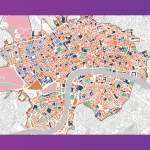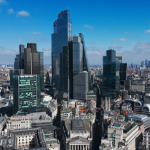Rachel Blake is striving to do what no other parliamentary candidate has ever done – be a Labour MP that counts the Prime Minister and the King as their constituents.
At some point over the next year and a bit, the country will go to the polls. The voters of Cities of London and Westminster – a constituency which has existed in one form or another since 1950 – have always elected a Conservative MP.
Might this change next time? Blake certainly hopes so. And during our interview, a sure sign of her on-message focus on the job ahead, is the map hanging on the wall behind her of the constituency she hopes to represent.
And what a constituency it is! Stretching from the edge of Tower of London in the east, to Kensington Gardens in the west. From Euston Road in the north, bound by the bendy Thames to the south.
But the job ahead for Blake is a hard one. If she is to win the seat, she’ll need to overturn a Tory majority of nearly 4,000 and leapfrog the Liberal Democrats, who finished second last time around. The sitting MP is Nickie Aiken, first elected in 2019 and herself a former Leader of Westminster City Council. Yet, on the basis of current opinion polls, and bolstered by Labour’s historic capturing of the City Council in 2022, one of the remaining smudges of blue on the political map of central London appears vulnerable.
This is Blake’s first attempt at becoming an MP. She has been a councillor at Tower Hamlets since 2014, during which time she has previously been a Cabinet Member for Strategic Development and a Deputy Mayor, prior to the election of Aspire’s Lutfur Rahman as the borough’s directly elected Mayor in 2022. It’s a borough that’s famed for its highly-charged and volatile politics – perhaps the ideal breeding ground for the bear pit that is the House of Commons.
Her time as a councillor has proved formative for her political beliefs and passions. Housing and economic development are strong threads that run through our interview. “As a councillor in Tower Hamlets, I had a significant amount of casework and conversations with Londoners about their housing situation”, Blake tells me, “and I think that really informed my political priorities and my political passions”.
It’s clear Blake is bringing that same passion to the battle in Cities of London and Westminster. And you can see why – despite being home to some of the most affluent streets in the world, it is an area of sharp contrast and a very unique housing situation. According to the ONS, over 90% of residents live in flats, apartments or maisonettes – the average for England is just 22%. Over 70% rent privately – nearly double to national average.
We talk about planning reform and the recent set of announcements made by the Labour Party at their recent conference in Liverpool. Blake gets the importance of reform for developers – “I worked for the Treasury on planning reform and one of the things that really stuck out was certainty within the planning system and I know that this is the top thing the sector is talking about – greater certainty within the planning system” and that “Keir Starmer and Angela Rayner’s speeches were really clear on the importance of certainty and for developers and builders being able to make those long-term investment decisions”.
But she also makes an interesting – and less often articulated – point about how planning reform matters and will benefit local residents too. “I know just how long it takes to bring [forward] planning applications”, Blake said, “which is also not good for residents who want to have a clear, transparent chance to contribute to the state of the built environment in their area, and it’s also not good for investment in good quality new developments which local communities will benefit from”.
When asked what she would look to get out of a Labour Mayor and a Labour Government should she and the party win the next General Election, Blake – without hesitation – picks up on the opportunities for the constituency presented by the challenge of reaching net zero. “I will be campaigning for there to be a lot more focus on supporting the local population, and those coming out of schools and education, to get the necessary skills to support the enormous amount of work that is going to need to happen in the built environment for us to reach net zero”. Clearly identifying the huge task ahead of retrofitting commercial buildings in central London, she points to “a clear virtuous circle that will bring enormous benefits for the country but also for the residents of Cities of London and Westminster” of upskilling the local population to be ready to take on the workload.
Another concern for Rachel is that of policing. Many parts of London become frustrated when officers are switched from their local area on to major public safety priorities like demonstrations in central London (what is known as ‘abstraction’) but as Blake points out, this “impacts on high streets and neighbourhoods even within Cities of London and Westminster constituency.” She points to when a Labour Mayor and a Labour Government “made local policing in the city a real priority, and we brought down crime with a strong local community policing focus” as what she hopes could be achieved.
Blake previously worked for developer St George (part of the Berkeley Group) and was a housing strategy manager for the London Borough of Barking & Dagenham. She highlights these roles as giving her important experience of “getting… homes built, getting investment into council homes and developing effective partnerships with housing associations”. More recently, Blake has worked as a consultant for Renaisi, a social enterprise in Hackney that helps to maximise the social value from efforts to regenerate local neighbourhoods.
It’s obvious just how much housing exercises Rachel. “For me, it’s about the cost of housing and the security for those who are renting, and what this all means for delivering public services and holding communities together”. She highlights the case of teachers commuting into schools in the constituency from places like Surrey, spending thousands on transport fares, because there’s nowhere local for them to live that they can afford. But also talks about the conversations she’s had with local businesses “about the challenges they’re having of recruiting and retaining staff, many of whom are having to travel longer distances because they’re being pushed further and further out of the city”.
When asked for the one thing that could make the biggest difference to the area’s problems, Blake argues that “the overall supply of genuinely affordable housing” and that the solution is “consistent investment in genuinely affordable homes along with stabilising rights for private renters”. She also talks for some time about the importance for the constituency of leasehold reform – something that both the Government and Labour opposition have committed to do – as well as the need to abolish Section 21, so-called no-fault evictions, something Blake says “causes real misery” to the high numbers of private renters in the area.
There’s still potentially a long way to run until the General Election and being a candidate is a lonely existence. But Blake’s enthusiasm isn’t dimmed. She neatly sums up what might happen with a fair window behind her: “what greater motivation is there than the prospect of being a Labour MP in a new Labour Government, with a Labour council and hopefully a Labour Mayor, representing the best part of the best city in the world?”.
This interview was conducted by London Communications Agency on behalf of the London Property Alliance as part of its curation of the monthly Central London newsletter.
Read more from our London Leaders series here.


